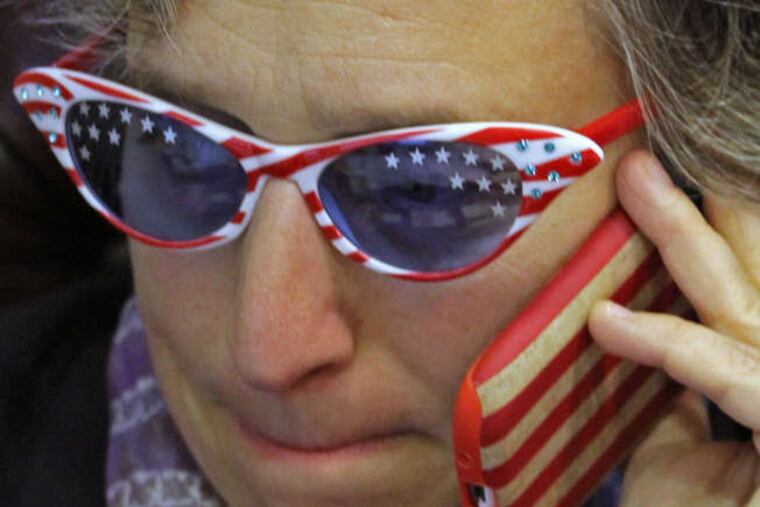The super PACs are coming!
The 2015 race for mayor in Philadelphia could see big-money spending by groups working apart from the candidate's campaigns.

CLOUT DOESN'T want to get all Paul Revere up in here about the 2015 race for mayor in Philadelphia but it's fair to exclaim: The super PACs are coming!
It has been widely expected that people and groups unconnected to mayoral campaigns in 2015 may spend big money to influence the outcome. That is legal if there is no coordination between those spending that money and those seeking the office.
It's also a way to work around the city's campaign finance law, which limits contributions to candidates to $2,900 for individuals and $11,500 for political action committees (PACs) per year.
A lawsuit pending in Harrisburg, filed three weeks ago by a super PAC, could change the mayoral money game.
General Majority PAC, based in Washington D.C. and active on behalf of Democrats in New Jersey legislative races last year, is challenging the constitutionality of a Pennsylvania law prohibiting PACs here from accepting contributions directly from corporations and labor unions.
A super PAC is allowed to raise unlimited amounts of money from people, corporations, unions and other sources.
A federal judge on Monday issued a preliminary injunction, preventing the state from enforcing the law until he rules on the merits of the lawsuit. The state did not oppose the injunction.
A win by General Majority PAC would mean super PACs could have a broader bank to draw on in the 2015 race for mayor.
"I think this opens up the door even wider to big independent money wreaking havoc on the city's contributions limit," said Adam Bonin, a Philadelphia attorney active in political cases.
It will fall to the Philadelphia Board of Ethics to determine if super PACs avoid coordination with candidates and to make sure they file finance disclosure reports.
"This will mean there will be an opportunity for more of that type of spending," said Michael Cooke, the Board of Ethic's director of enforcement. "The super PAC mechanism makes it easier for that to happen."
Potential candidates for mayor see the possibilities and risks.
City Councilman Jim Kenney said the "downside" to super PACs will be that the media will tie the groups to any candidate that benefits from the spending.
"What is it about you and your policies that they think is so intriguing that they're willing to put up millions of dollars on your behalf?" Kenney expects the 2015 candidates to be asked.
City Controller Alan Butkovitz sees an "inexorable momentum" toward super PACs.
"It leaves me cold," he said. "I don't like where it's going."
Asked if a super PAC might back him if he runs for mayor, Butkovitz laughed and said:
"Boy I sure hope so."
Brady: Singer is wrong
City Commissioner Stephanie Singer turned plenty of heads in the city's Democratic Party Sunday with an email to about 4,000 people on her campaign list, complaining about the process ward leaders used Tuesday to select a special election candidate for a vacant City Council seat.
Singer claimed the party's committee people, elected by voters, would make such a selection in every other county in the state.
U.S. Rep. Bob Brady, the city's Democratic Party chairman, calls that "dead wrong."
Two Democratic chairman, Marcel Groen in Montgomery County and David Landau in Delaware County, told us their party's equivalent to ward leaders select special election candidates.
John Cordisco, the chairman in Bucks County, said judges there select special-election candidates recommended by the local political party chairmen.
We tried on Wednesday to get Singer to tell us how she came to the conclusion in her email.
She repeatedly dodged the question, referring us to the bylaws of each county's Democratic Party. She refused to say if she reviewed those bylaws herself.
Council: No $$ hearing
It's tradition. Every year, as City Council ramps up for budget hearings, the Committee of Seventy asks for a hearing to be held on Council's own annual budget.
Council President Darrell Clarke always denies the good-government group's request. Yesterday, he called it "ridiculous."
Council's budget for the fiscal year that starts July 1 is $15,814,559. Clarke says anyone can file a records request for information about that budget.
"I don't know how the Council asks itself questions on its own budget," Clarke told reporters.
We joked that the reporters could ask the questions.
"I will entertain that when the Daily News comes forth and lays out its budget and its employees and its personnel," Clarke said.
We noted that the Daily News, owned by a private company, is not a tax-funded government.
"I absolutely know that," Clarke responded. "But since you are very opinionated as to what we should do in government I think it would be reasonable to have that entity that is very opinionated open its books."
Quotable:
"Tom Wolf's television campaign has been startlingly effective, and he has taken a commanding lead, having reached support of 40 percent or more."
- Former state Environmental Protection Secretary John Hanger, withdrawing yesterday from the May 20 Democratic primary election for governor. Former state Revenue Secretary Tom Wolf, who invested $10 million of his own money to run for the office, surged in the polls recently after running several campaign commercials.
Phone: 215-854-5973
On Twitter: @ChrisBrennanDN
Blog: ph.ly/phillyclout